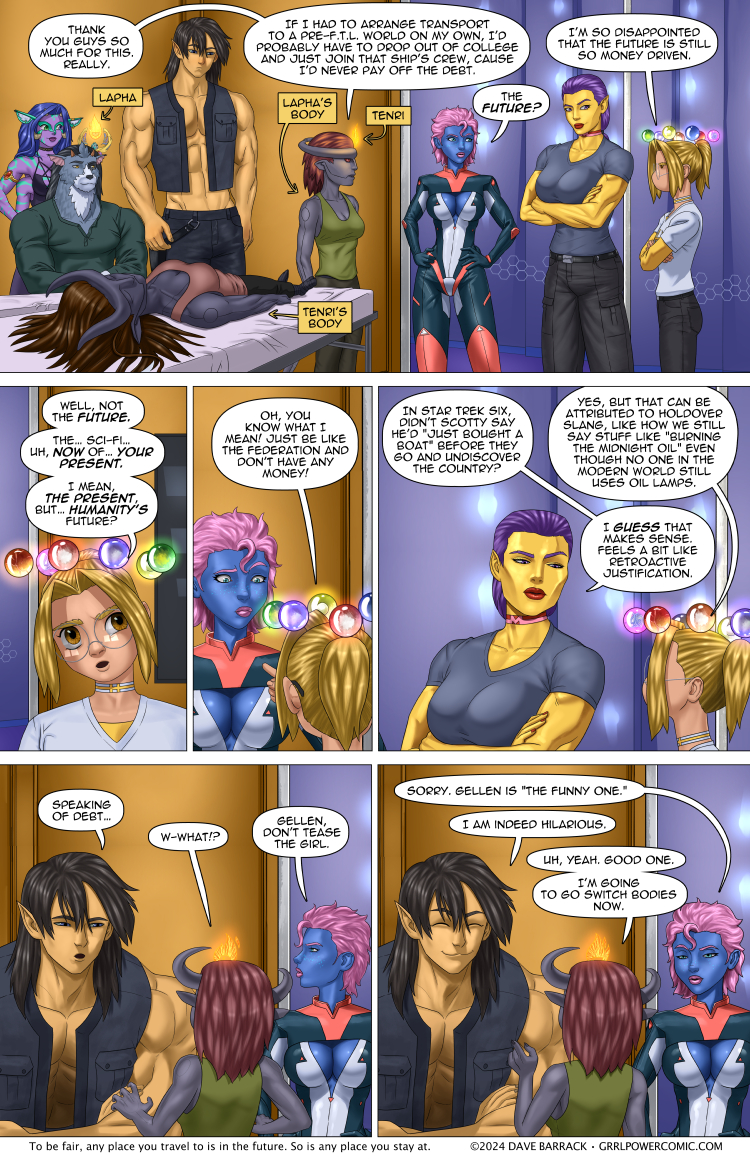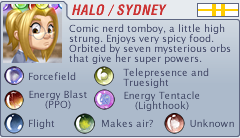Grrl Power #1250 – Orderly friday
Gellen is supposed to look like a (very tall, buff) yaoi pretty boy, but man, I am not practiced at drawing that.
I’ve talked extensively about money in a post scarcity society, and generally came to the conclusion that the only things that would be of value would be information, energy and probably time. Something that takes the same amount of energy to create on the matter replicator but takes longer to form because of… delicate molecular lattices or some other science words, would be more expensive because of the opportunity cost. So yeah, time would probably be a factor.
However, since buying groceries with a thumbstick that has the 3D model of a ’92 VW Bug transmission on it, or handing over a brace of D-Cell batteries probably wouldn’t really be viable as currency for a number of reasons. So really, a post scarcity society would probably still have money, but it would be imaginary money like any country that’s moved past the gold standard uses.
Nothing has value unless people agree it does. When the 2008 toxic CDO’s and CDS’s blew up the economy, it’s not like any dollar bills or gold doubloons burned up in a fire or anything. Some numbers on a lot of computers went down, and we all “agreed” that it was bad. Honestly I’m not really sure why instead of bailouts, the government didn’t just go, “Look, this one time, you can type a few extra zeros back in.” Besides setting a terrible precedent, obviously. More terrible than bailing out billion dollar banks and not even breaking them up into smaller institutions and implementing a bunch of regulation, I mean.
But my point is that despite “money” having no real place in a post-scarcity society, I think it would still unfortunately be kind of a necessity. Otherwise, wouldn’t everyone be like Scotty and have a boat? If it truly cost nothing to have a boat because “cost” is a depreciated concept, it seems like most people would keep a pretty nice boat around, just in case they decided they wanted to spend the afternoon lounging on the deck of a boat. But… where would they keep them? I guess if money really was no object, then you could build massive underground boat garages and you could retrieve it by pushing A27 like you’re getting a Zagnut bar out of the vending machine. Well, presumably, engineers would have better things to do than to build boat garages for 380 million boats, so, money.
As far as Scotty “buying” a boat… Honestly, there’s three ways to look at it. 1) In the Federation, you can just Matter up a boat, and what Sydney said is true, that he was using holdover slang. 2) The other, more likely explanation was that the writers didn’t know/care about the Federation supposedly being post scarcity. 3) The other other explanation is that they did, but they didn’t have a graceful way to have the line “I just replicated a 40 meter schooner.” without making their test audiences go, “Uh, what?” So they sighed a heavy sigh and changed the dialog to lowest common denominator for brevity’s sake, even though they wrote a really deep in the weeds 17 pages of dialog between Scotty and the whale doctor lady from Star Trek 4 who was at that meeting for some reason, but the real reason was so she could act as the audience exposition surrogate when she asks Scotty to review the finer points of 24th century economics with her. Because I definitely would have written that, then gotten all sullen when the studio execs were like, “What the fuck are you writing about? You turned in a 1,500 page screenplay! Cut 93% of it!”
The new vote incentive is up!
Every so often I get the urge to try and draw Maxima all properly shiny, and this… isn’t my favorite attempt if I’m honest. I’ve been sitting on this for a little while doing little tweaks, and decided to finally publish it cause I’m already behind on these. The next one will (almost definitely) resume the trend of including a little mini comic to extend the scene a bit.
As usual, Patreon has some outfit variations as well as sans flagrante.
Double res version will be posted over at Patreon. Feel free to contribute as much as you like.





















These “rants” always seem like they were written by Sydney. Off her meds.
You know where Sydney and all the rest come from IRL.
The Jungles of Borneo?
*Starfleet* is post scarcity. That doesn’t mean the rest of the Federation, including Earth, is. If energy is considered to be valuable, there will be a way of trading that energy without actually exchanging batteries. Call it an ‘energy credit.’ And while a replicator can make a lot of things, boats are likely to be assembled just like they would be today; by hand or on an assembly line. Starfleet still has shipyards that build starships, after all. Not giant replicators that magic them up out of nowhere.
Technically, Earth is post scarcity too, as are most inhabited planets excluding colonies still working their way up. Though heavily populated planets like Earth develop a new form of scarcity in the form of available space. Pretty much the only things still scarce are matters of prestige. Specific locations or artifacts where a perfect replica wouldn’t have the same social value.
Even in the original Star Trek there were humans that used money and Starfleet was dependent on them. Like the dilithium miners in that episode with Harold Mudd in it. It was constantly stated that they were wealthy because of the mining jobs they did selling dilithium to Starfleet … AND the miners were slso federation citizens.
Plus there are other species that use currency, mainly gold-pressed latinum.
Also worth noting that the 20th century capitalist that was in a ST:TNG episode ended up the Federation’s ambassador to Ferenginar.
Not “Harold”. Harcourt Fenton Mudd III. As you were.
‘Harry’ to is friends
It’s a pretty common misconception that the Federation doesn’t use a form of currency. They do. There is a line in TNG where Picard says the accumulation of wealth is no longer the driving force in our lives. If you dig through the lore, it becomes clear that on Earth and other well developed Federation planets, people are given housing. It might be a one room apartment, but there are no homeless. People are given basic food to survive, bland replicator meals, but they won’t starve. They are also given basic medical care, no dying because you can’t afford life saving treatments. If you want more than that, you have to work for it, you get paid, you buy better stuff. No one ever really says money in every form is gone, just that it’s less important. People know they aren’t going to end up on the street, starving. the pressure is gone, so they can work to better themselves.
There was an episode of DS9 where Bashir and O’Brien, lost their life savings to Quark thinking that Bashir’s augmentations would give them an edge.
Although Jake still had to glom on Nog’s savings to try to buy a baseball. While simultaneously touting how great humans are for not needing money and currency-based economics anymore.
“Well… if you don’t need money, then you certainly don’t need MINE.”
https://www.youtube.com/watch?v=Wx5I7uEEEYo
Clearly. Post scarcity doesn’t mean infinite resources. They’re not the Q-continuum.
Even they had a horrible Home Owners Association to deal with.
Work because they want to, not because they have to
Sisko’s dad owns and runs a restaurant because he likes cooking and providing non-replicated food to people, who also enjoy eating what he provides and pay him for it: not for the food itself, but for the service
My mistake. Harcourt. I lose two nerd points.
Post-Scarcity doesn’t necessarily mean that everything is free. It can mean that everyone’s basic needs, sustenance, shelter, medical, transportation, and socialization, are considered a right and do not cost money. Luxury items do cost money and jobs are worked both to have additional luxuries and to pursue your calling. One of the ways to do this is a regulated economy(where the cost of basic needs never exceeds the minimum income) paired with a universal basic income. It is only achievable in a civilization that has mastered renewable energy production and the automation of labor jobs and where both of those are not owned by private industry.
“Post-Scarcity doesn’t necessarily mean that everything is free”
That’s true. Even in a case where we had a magical technology that could create food from nothing, there will always be some level of scarcity – knowledge scarcity, ability scarcity, TIME scarcity, space scarcity… And yes I know you can always live somewhere other than Earth, but Earth still has a limited space of places where you might WANT to live – if you want to live near a view of the Golden Gate bridge and near StarFleet, and not just some hologram representation of it, or don’t want to have to use a transporter in order to get to Sisko’s Creole Kitcken in the French Quarter of New Orleans, there’s a limited amount of space to do that. Hence scarcity.
Plus there are some things that cannot be magically created with replicator technology because that object loses its value. Like Sisko could replicate a baseball signed by Buck Bokai, but it wouldnt be an actual signature by the actual Buck Bokai. It would be a counterfeit – it would not have the numismatic value that a real baseball had. Or Picard’s antiques from archaological digs could be replicated, but they would not have the same numismatic value of the real thing.
Also the more complex machinery is in Star Trek to get your everyday unpalatable labor needs done without compensation, the closer you get to a slave race, as we saw with both Data’s trial or the Exocomps or potentially light-based construct organisms like Moriarty or The Doctor on Voyager.
And even then the availability of Holodeck technology means even living space needn’t be a premium. No need to compete for beach side property when you can perfectly simulate it to the point your brain is incapable of telling the difference.
Yeah: you want a great view out of your room? No need to pay thousands for a penthouse when you can get the exact (literally in some cases) from a sub-basement one-room hole in-the-ground
Until there’s a power disruption. :)
Or an earthquake in the Bay area that destroys what the view is even of
There are drawbacks and flaws in everything (especially me)
I might be wrong, but I think that Earth has technology which prevents the damage from earthquakes actually, as well as a weather grid (not as extreme as the one on Riza, but they do have one, at least in TNG – they didn’t have it in TOS up to the 4th movie at least).
Still you make a good point that there are always drawbacks and flaws that will always cause scarcity.
Earth and much of the federation are post scarcity due to fusion reactors making power so cheap that the government gives everyone an energy credit large enough to replicate almost anything you need without having to worry about using it all up. Sisko mentioned that he was cutting it close when he first joined Star Fleet Academy because he was transporting between school and home multiple times per day.
In a couple of places they have talked about individuals having a teleport budget
I’ll just comment that we keep and have used several kerosene and coal oil lamps for emergency situations such as hurricanes and ice storms. Kerosene/oil heaters are still fairly well used in some locations.
On the money thing DaveB’s final point is one of the main reasons for any sci-fi or fantasy setting regardless of technology or magic to keep currency around as a thing, relatability for the audience. It also makes world building a little easier when you don’t have to explain a replacement system that drives trade both internally and between different worlds and species. *granted later Star Trek would have latinum as a materially that *magically* can’t be replicated*.
But the relatability element is something we see in many series and why certain things if we thought about them wouldn’t make sense to have in the setting, or that other elements of the world would make sense to be there as we go down the cause and effect and tech/magic of the setting but wouldn’t be something your target audience could relate to so might take them out of the story, especially if you have to spend time explaining it. An having an excuse to break pace and have something explained is its self such a pain (and may be one reason Isekai is so popular for fantasy settings now as it is a handwave…well of course we have to explain how everything in our world works as we come across it the main character isn’t from here, so it makes sense we’d have to), its also one reason why the magic school setting *aside from flavor of the week reasons* was so popular for a time as teaching students at the same time as the audience. But Isekai makes it possible to not be stuck in that setting/genre of school or college or whatnot.
But back on the relatability, while not money, I think a good video on this relates to telephones, communication. In both fantasy and sci-fi going all the way back to the early days of both, there was an obvious solution to a lot of plot problems, they could have just called for help, or communicated their situation, contacted someone for information long distance. However for the longest time, even with telephones existing, this was able to be ignored in all these shows and comics and novels etc… because for the audience they had land lines, or needed an office to make long distance connections, even just thirty years ago there were charges for text and long distance calls. But in more recent years cellphones and easy pay plans and such have become common, so now younger generations are asking *why don’t the characters just do what we can do?* the sci-fi and fantasy elements had fallen behind the real world, and this does have that strain on the writers to either need to explain why they can’t (the signal is jammed, spell wards precent crystal balls), which would keep with the normal writing patterns for the story beats… or incorporate them into the world.
On that note; Overly Sarcastic Productions did a good job on that.
https://www.youtube.com/watch?v=2Pw_7vAK9k8
this relates to money as, the audience has money. The audience goes to jobs because of money, live in a world with currency based trade economies with agreed upon values of one’s exports and influence to adjust the value. So just move it over into the setting so the audience relates, the man making grilled avidon, boar-chicken, land squid on a stick, alien slime candies, whatever, at the local festival, you give them copper coins, space bucks, etc… and that’s the end of it.
I think world building wise, we can always just say its not fully post scarcifty or that, that is even a thing. Have the governments predate that technology, so their economists viewing it as a threat, limit its use, it can only be used to make raw materials, nothing organic, or construction of the equipment alone or energy use is its self expensive enough that it can’t be used enough to replace the conomony. So we still need other machines and people to maintaine those machines and their paid skilled labor to assemble all this, then that goes down the line to hands on needs to repair homes, invent, art, be the creative element behind new products, prepare food, etc…
just because you can have a machine make stuff, doesn’t mean it should or could in some cases be used to replace everything so well that it undermines the entire pre-existing economy and labor forces. Its like “I’m the guy maintaining the machine that makes materials out of inputted molecules* but I need a return for my labor, and then the labor they hire, etc…
basically currency, simplifies things. Its why we got it in the first place so we aren’t giving people pigs and eggs and iron nails (historical reference there by the way on the origin of currency in Greek city states and the invention of the banking system), instead using a “points” an agreed upon value of the labor, skills, and effort needed to do something. Even if the society can make anything, doesn’t mean the population or the pre-existing economy, or government systems are going to be too keen on just abandoning their previous system, and over time see a hybrid of (sure we can make anything, but we still earn money to spend how we want, including using the money to operate the replicator machines to make the things they want to buy…like a replicator vending machine), because in the end of the day, someone has to maintaine that machine and all the other creativity elements to create brands and what not as well.
So in the end currency in your setting can be because
1: Relatable to the audience
and
2: The society in the setting wasn’t always post scarcity and the technology had to grow overtime so you end up with a composite of can make stuff but currency is agreed to be sueful to keep things simple for trade and payment for work.
Consider Neptune’s Brood, by Charles Stross. The concept of money broken down to: Fast money (for day-to-day transactions), medium money (ordinary investment instruments), and Slow Money. Slow Money, in the book, is used for interstellar transactions, traded at (effectively) 1/3 the speed of light (verification times), and maturity measured in centuries or millennia. Think: the stake to start a new colony.
Neptune’s Brood isn’t a post-scarcity economy, but it is distinct from how currency is used today.
if it were 3) whould’nt he just say he “got” a boat?
because he likely swapped something for it, so he paid for it in one manner or another. Be it just time or hours spent on private projects or SOMETHING.
TNG does have a history of them using barter instead of currency. Like Riker offering a trade of one gram of biomemetic gel for some alien’s cargo (that I think was meant to be purchased by the two klingon sisters).
Or when they were negotiating for rights to a stable wormhole against other species that do use currency.
Tenri seems to be significantly less well financed than her peers.
Parfait is the descendant of a high profile politician.
Lulu is the descendant of a industry Titan.
Aster is at least an officer in training and can pay for interstellar travel to a pre-ftl world for five people(he pays for their trip).
I’m curious to the socioeconomic situation here.
That’s pretty typical for the college experience to have friends from different socio-economic backgrounds, at least on Earth, who knows for aliens of course. Just anecdotally from my own experience in college, I was the at lower end of middle class surviving on grants and loans and had one roommate that was better off then me, but not by a lot and my other roommate who paid off his rent for the year in one lump sum and whose mother sent him 500 dollars every couple of weeks for his “allowance”.
College, at least in my day many years ago, is one of the few place where the haves and the haves not as muches mingle and get along.
This suggests that Tenri is an unusually good student or otherwise talented, to me.
As long as effort must be expended to do anything, paying people to do it for you will be a thing.
Exactly. The materials to produce the item may be infinitely available, but the time (and skill) of the person making the item or the space to put the item (like the boat example) is never going to be infinite.
There is no such thing as the past or the future. There is only now, and the impressions inside your brain of what made now.
First, if boats were completely free, every guy from 15 to 60 would have them. Dozens of them. Soon the scarcity would be “water not covered in boats”. With this in mind and considering a post scarcity civilization, most likely, Scotty is obtaining an exclusive contract to a certain boat so that he does not have to share it with others. Like as a houseboat or racing boat.
Why? You couldn’t use them. Why would you have a dozen boats you never use? Seems like a lot of trouble. If you’re not living in a society where your status is defined by the value of your possessions, then just possessing things you don’t need or particularly want is crazy
Capitalists assume that the only thing stopping you from eating ice cream until you literally die from ruptured digestive organs is the price point.
Thus, the only thing saving us from being crushed under the mass of a kajillion unusable boats its the price tag.
They literally think that the supply-demand curve we all got handed in Econ 101 is some sort of reality-defining formula that commands human behavior, rather than a moderately useful model based on general observations, most of the time.
I personally dream, on a monthly basis, of building a solid-steel mountain reaching all the way to space. It would use something like 10 times the current annual planetary production of steel, and I want it JUST BECAUSE.
See also the extreme lengths MMO servers have to go to keep certain locations from being overcrowded, and internal currencies from utterly melting down, just because things are SO CHEAP, that everyone aspires to have one of everything…
I OBJECT!
…as an MMO player, I have never sought to have “one of everything,” and only invest my time going after one of a few very specific things, for silly RP reasons. ^_^’
Otoh, I play FFXIV, so maybe I don’t count. X’D
I played Asheron’s Call, and believe me, I did seek to have at LEAST one of everything. :)
PS, I also needed to have one of each of the Final Fantasy games.
You know, I never got into AC. I play casters, and when I first looked into it, their site said that the more people knew a spell, the less powerful it was. Seemed like a bad deal, for someone who plays finger wrigglers almost exclusively. ^_^’
I played it since I was in elementary school until I was in college when it shut down. I usually played a crossbow user, although I did have a mage as well. I wound up collecting at least one of almost everything in that game, including stuff which was no longer available, like Gertarh’s Dagger. I think there were only a few things I couldnt get because they were one-of-a-kind or from very special events in the beta.
And honestly I think that mages were probably the most OP characters in AC (xbowers were the least, but I liked playing her for the challenge). They used to not be, but there were several updates which massively powered them up until they were the most powerful characters you could choose – especially once they fixed spell components.
The only other MMORPG I ever really played at all was Runescape. I tried a few others like City of Heroes (never tried WoW) but I just couldnt get into them once AC shut down and I didnt want to wast the time for a game that would ultimately shut down as well. AC was unusual in how long it lasted with a sizable player base (like 20 years).
My friend had been trying to get me to play DCUO for years and I keep saying nah, I’m way too busy at this point for that. Stupid adulting.
Well, I can honestly say you didn’t miss much in WoW, or DCUO.
The former was badly written – with the notable exception of the Wrath of the Lich King expansion – and the latter has such player design graphics/system, and awkward power set design that both just…well, in a world without better choices, they’d be fine, I guess?
All that aside, I recommend FF XIV. It has an indefinite “free trial” that gets you the vanilla game and the first two expansions, so you can really dig into it and get a good feel for whether or not you want to buy the full version. It’s well written, and as the game itself has grown they’ve reduced the grinder elements of the vanilla game. If you’re all that much of a completionist/collector, the class system will appeal to you, and the crafting system in specific will make you smile, as it encourages you to create one of everything. It’s a good casual game, tbch, and that’s part of why I love it. That, and it is written such a way that you actually feel like “The Hero,” and not just random Alliance/Horde grunt #35716.
There are some downsides, of course. Some content is still a little grindy, most content is locked behind msq, so you have to advance the main plot in order to access content (generally a good thing imo, but it can make playing with friends difficult, if you’re not in same general content cluster), and trial accounts in specific can’t trade with others, use the market board, join guilds, etc.
But still, I recommend it as a good, generally very satisfying casual experience.
“Well, I can honestly say you didn’t miss much in WoW, or DCUO.”
The more I saw of WoW on youtube, the less I was interested. Warcraft felt a lot better to me as a single player strategic game than an MMORPG. And I honestly tried to like DCUO because my friend was so insistent, but I was so bored with it.
Although I did love Second Life when I used it for a few years, learned how to design clothes and stuff on it, and got paid some actual real money in high school via Lindens as a DJ and briefly running some stuff in a casino. That was actually fun. But not by any stretch of imagination an MMORPG.
I did really like Asheron’s Call though. It was actually fun lore and not just a ‘run around and shoot things’ deal where I had no idea why I was doing anything, like it was in DCUO.
Warhammer: Age of Reckoning was, and will always be, superior to WoW… that’s why it didn’t last long :(
WoW continues because of all the porn that is made of it
There are emulators around that you can play AC on again. Lots of them on the AC Reddit channel you can get into.
Started up on Reefcull about six months ago as research for my newest story. Man, it sure does bring me back.
Was Aelryinth on Leafcull. Started 3 days after retail launch and lasted until 2009, over two years of non-macro time ingame, 275 on archer, mage, sword.
Mages are by far the best way to go in AC Bharda, and always were. The ‘spells get less powerful’ was actually ‘spells lose their bonus damage’ and revert to base, which was plenty powerful. That whole mechanic is actually gone now, as is the wonderful spell research it was derived from.
But, yeah, the AC emulators really do bring back the original feel, including hte Allegiance system, still the best of any game I’ve seen.
“Was Aelryinth on Leafcull. Started 3 days after retail launch and lasted until 2009, over two years of non-macro time ingame, 275 on archer, mage, sword.”
I was mainly on Frostfell (Marisa) and Deadtide (I was a member of the Borg guild – it was fun). Played until the last day, and my guildmates helped me get every single character to max level on every character by the end (even the mules:) ).
tt was mainly for bragging rights lol.
“Why? You couldn’t use them. Why would you have a dozen boats you never use?”
Have you seen Jay Leno’s garage?
Did you read what I wrote about status being determined by possessions?
“a society where your status is defined by the value of your possessions” is every society, ever.
It’s just the way most people are wired.
You don’t think people ever hold status because of their wisdom, their strength, their skills, their relationships? Possessions can be a conspicuous, persistent sign of status, but they’re not necessarily the basis of it.
That kind of mentality would be flagged early in the federation and the child would receive personalized counseling and therapy, as that is clearly an irrational and somewhat disturbing expression of need.
Just my 2c on star trek economy. Sure, every citizen gets all the food,and basic material goods they want as soon as the antimatter reactors are hooked up to the replicators. Even a basic living space. But if you want to see a concert in person, or take a test for a flying license, or get some personal training so you can pass it next time, well. Need to pay some creds for that service.
It always gets me that capitalists just assume that if everyone gets a home, food, etc, that suddenly nobody will make video games, comic books, or home brew beer kits anymore.
And it always blows my mind that socialists/communists just assume that if everyone gets a home, food, etc, that suddenly, greed, sloth, avarice, envy, fear and ignorance will suddenly vanish like a puff of smoke. These systems haven’t worked throughout the course of human history because, well, humans are human. It’s going to take a significant change in the human condition for any system to successfully replace capitalism, and looking at my fellow modern humans, I don’t see that happening anytime soon. I doubt post-scarcity will fix the human condition any better than anything else in history has.
As much as people bemoan capitalism, it has benefited humans more than any other economy in history. Sadly, greed, sloth and envy still hold us back.
Short version:
“I can’t imagine X, therefore X cannot exist.”
“Relative privation fallacy.”
“If the alternative isn’t demonstrably perfect & fails to eliminate all antisocial behaviors in all individuals, then it isn’t “good enough.”
Typical right-wing flim flam.
Literally no “socialist/communist” is claiming that changing the economic system will suddenly eliminate greed from every person. For example, the former owner of an expropriated factory will still feel entitled to the value created by the workers.
Look, I know you think that bandying about phrases like “human nature” and “human condition” sounds all lofty and shit, but really it just exposes that you’re unwilling to change the status quo. It’s the Is-Ought Fallacy with an extra step & window dressing.
Notably however, any new solution needs to provide better results than the old solution in order for people to buy into them. Like how nordic models of union-strong market economies provide better results for people than economies that almost abolished unions.
A system that can make better use of other human urges like creativity or curiousity like market economies does greed might very well do better, but first it needs a theoretical way for that to happen. Even if it’s just a simple change like “if you can present a decent business plan, you can stay on unemployment for 6 months while getting it going” as Sweden has.
I don’t think people are closed to new solutions (except those already in power), but to convince them one has to offer something that is clearly different in a beneficial way from what was before so that it doesn’t fall to the same traps as last time.
Two things spring to mind, here.
The first is a pair of quotes, from Teddy Roosevelt & Franklin Roosevelt, respectively:
“In any moment of decision, the best thing to do is the the right thing, the next best thing is the wrong thing, and the worst thing you can do is nothing.”- TR
“It is common sense to take a method and try it. If it fails, admit it frankly and try another. But above all, try something.” – FDR
The second is that, is as far as US domestic policy goes, we actually have already proven methods for improving our current state of affairs. Methods that don’t even require ending capitalism. Again, FDR led the way with the New Deal programs. Some were duds, like the NRA, but others worked out exactly perfectly, like the WPA, or the TVA.
Of course, the oligarchy would immediately start screaming bloody murder and declare the end of civilization if we reinstated any of those, or any of the banking, investment, and finance regulations that resulted from The Great Depression.
Is probably this.
Everybody gets what’s needed for a decent living, if you want more you pay for it.
So people are free to do whatever job they love without the threat of starvation or ending up sleeping under a bridge.
Reminds of a quote.
“The Law in its equitable wisdom prohibits both the rich and the poor from sleeping under bridges.”
Full quote, “The law in its infinite wisdom prohibits the rich as well as the poor from stealing bread and living under bridges.” I don’t remember who said it because I can’t remember names for crap, but IIRC he was a French Philosopher. Hang on I’ll google it. I got the quote wrong but the essence of the statement right, and the dude’s name was Anatole France
The rich and the poor get the same amount of ice. The rich in summer and the poor in winter.
“Reminds of a quote.
“The Law in its equitable wisdom prohibits both the rich and the poor from sleeping under bridges.””
Indeed. So horrible. We should definitely repeal that law. That way, we can look like California!
Oh wait… nobody in their right mind wants that.
Compassion for difficult situations does not magically make problems go away. Vagrancy laws exist for because we know from experience what the world looks like without them, and what it looks like is BAD.
Oh, look, the mighty culture warrior reveals himself.
That compassion alone does not solve problems goes without saying, and is why decent human beings with functioning moral compasses understand that the system must be changed account for and solve these problems.
I love how your go-to for homelessness is literally just getting it out of sight.
Very on-brand.
“I love how your go-to for homelessness is literally just getting it out of sight.”
And I love how you conveniently “read my mind” and know what I supposedly think or want. It’s always so convenient for you to paint me as a villain.
It’s also utterly dishonest, but hey, par for the course when attempting to debate with people who champion socialism.
“I love how your go-to for homelessness is literally just getting it out of sight.”
Wanting anti-vagrancy laws does not, in fact, mean I am opposed to actual attempts to help the poor. It’s not implied. It’s an invention of your fevered imagination.
Well, or just a lie made whole-cloth to attack people who would dare to disagree with the all-knowing and magnificent Bharda.
And vagrancy laws don’t magically fix homelessness.
Real solutions to real problems require a bit more work than that.
Oh, come now, Torabi, surely you understand that if we just torment and harm the poor enough, they’ll get sufficiently motivated and pull themselves by their bootstraps, and magically not be poor anymore?
They do, by magically tranforming the homeless into criminals.
Pretty sad when people would rather pay to house the homeless in jails and pay to keep them there than to provide them with a hand up to become contributing, successful members of society.
It’s even more sad when you have no answer to something, so you just make up something to tar someone with.
Thinking vagrancy laws are a good thing, based on looking at how society works with and without them (including examples of both) does not, in fact, mean that actual attempts to help the homeless are precluded.
Those are not mutually exclusive positions. In fact, they both work better with the help of the other. Vagrancy laws provide the impetus to actually accept that “hand up”.
Again, go look at California – all the offered “hands up” in the world do no good for a noticeable subset of people without external impetus.
Or, you know, don’t bother looking and instead just go the Bharda route of libeling anyone who dares to look at actual evidence and therefore disagree with you.
I’ve seen a couple of books that literally had their currency called ‘Time-Energy Credits.’
The only thing that inevitably has value is scarcity. The form that scarcity takes may vary, but scarcity will be found or created as necessary. (See already NFTs, for example.) And realistically money will very likely continue to exist; once all your basic needs are freely met you could fall back to trading e.g. a handmade sculpture for early access to a first-draft book, but maybe what one of you actually wants is a series of home-cooked meals, and that’s much easier to work around if there’s a standard medium of exchange.
Maybe Scotty bought the boat from a non-Federation world/group/trader that still uses money? I’m sure there’s plenty of Ferengi out there quite happy to deal in nautical recreational vehicles…
The big thing is that a post scarcity society inherently needs a government that helps manage that state. The most likely course of events in this case is that Tenri would have the option to apply for pick-up but wait up to months for the next “Federation” vessel to either have free time or just be in the neighborhood. Option 2 would be to compensate the Crew that transports her back to Fed space given that she was the target of a kidnapping, likely with X units of free fuel and X hours of high end fabber time.
Why would she arrange travel to a pre FTL planet and try to stay in collage? Wouldn’t it be smarter to arrange travel to a Post FTL planet so she could travel onward to her collage?
Because her body’s on the pre-FTL planet.
Except, her body isn’t on a post FTL planet, it’s on Dirt
She was going to college on a post-FTL planet. She needed transport to (and back from) a pre-FTL planet (Earth) to get her body back (because that’s where it was taken). Is that clear enough for you?
Her body is on Earth, which is a pre-FTL planet. It’s more expensive for aliens to travel to pre-FTL planets than post-FTL ones, apparently. Since her body is on Earth, where Lapha went when she hijacked it, she had to travel to Earth in order to get it back.
Although I suppose she could have just had Cora’s crew bring her body back to her, but since her crew was already at the college when they arrested Garamm, it just made more sense to take Tenri back with them to Earth to get her back in her actual body.
The reason it’s more expensive is because they can’t just land at a spaceport… because there isn’t one, and what they are doing is illegal
I don’t think it’s illegal to travel to pre-FTL worlds. It’s just illegal to give advanced technology to those worlds. Remember, the Council has an entire group that handles all extraterrestrials, and he’s also affiliated with the Xevoarchy and took part in the negotiations for the FTL trainer ship. He didn’t have fun doing that.
If it’s not illegal, then why aren’t they openly landing in Times Square? Before the Fel fight
Yeah, Star Trek’s lack of money in the Next Generation era is stupid.
The elder Sisko has a restaurant in New Orleans.
What makes him have access to that building (ownership) rather than someone else? Why do people have to leave the building at the end of his work day.
As long as there’s property, there’s going to be some medium of exchange so humans can keep track of who has what and who can do what at particular places.
If you don’t have that, whoever gets the short end of the stick when it came to doling out property would never have a way to have a place of their own.
You can make an argument for people living in free apartment buildings. But there’s always going to be a desire and need for something beyond that (a place of business, a workshop, labs, a man cave, a cabin in the woods, etc.)
Gellen looks so much different than last time.
https://www.grrlpowercomic.com/archives/comic/grrl-power-674-space-cavalry/
Was wondering if we had seen him before
Dave’s art style is very much still developing, and hasn’t reached any kind of consistency. Characters get very much distorted by whatever reference he’s using for a particular pose for a particular page.
I guess that’s true. I just was surprised at how big a change it was from last time we saw him. It was, admittedly, almost 6 years ago when he last drew him, I think.
Joining the non-socioeconomic conversation to point out to DaveB that Gellen’s also been archived under the name “Galen”. I’d recommend consolidating the archives and maybe updating the character tags. Just my $0.02.
https://www.grrlpowercomic.com/archives/comic/grrl-power-714-such-navigation-so-wow/
Likewise his shipmate, sometimes he’s “Slyv”, but archived as “Sylv”. Old typos, but they’re confusing the database.
https://www.grrlpowercomic.com/archives/comic/grrl-power-762-this-presser-is-about-to-get-a-lot-more-exciting/
With regard to Slyv, I like his pupils. They give him a positive outlook.
My expectation would be that in a post-scarcity society, you wouldn’t necessarily use currency. In a situation like Tenri’s, it would literally be what she just described–joining the crew to work off the debt, which would be substantial since it requires taking the ship someplace it wasn’t already going. Since she’s a SpaceCollege student, she probably doesn’t have a lot to offer directly to the captain of the average ship, and so would have to just sign up on an indentured servitude contract.
I imagine a lot of informal currencies would pop up–essentially, targeted promissory notes to perform some task in exchange for “X”. The ‘buyer’ essentially has to either provide the service themselves, or find a suitable surrogate. There might even be virtual marketplaces where the contracts are traded around–“I’ve got one ship’s mechanic for three ship’s stewards!”
Man, that’s kind of a bleak-ish future. Could be mitigated by putting stipulations in the contract saying it can’t be traded without the worker’s consent, and ensuring standards of treatment for employees, and so on.
Of course, this is the DaveB-verse, where we’ve got multiple races created for the purposes of being enslaved, so… yeah.
Not really. We’d still use money, we’d just not treat it as the life defining and finite resource we pretend it is today.
It’s literally made up, we can change the rules if we want to.
Ultimately, all money is, is a promissory note with a generally agreed upon value and widespread acceptance, moving away from this general use to more a specific system would make no sense.
Also of note, even by today’s rules, no country with a reasonably stable economy can actually run out of money, they are literally the ones that can create more of it at the press of a button.
Right now, we could already agree that a country just has enough money to do its job without the needs of different departments haggling over budgets based on the tax that is collected.
We could potentially just agree to provide people with the minimum for a life in dignity (but not excessive luxury) and do away with taxes. All we’d really need is a mechanism that takes money back out of circulation to keep the value stable.
Tenri’s case could definitely be covered under a justice or law enforcement budget, because she’s traveling to get her stolen body back.
The only purpose of taxes is to pull currency out of the economy to control its value, and to offset the currency created by the government to pay for goods and services. The government does not actually need taxes.
But it does need to pull momey out of the economy and a way to determine where and how it gets pulled out.
There’s also a limit to how much can actually be produced, be it food or most crucially elderly care.
Not true. The real purpose of taxes is actually wealth redistribution, moving money from out of savings/retention and back into circulation. The government paying for goods and services is one way of doing that. Currency shenanigans are side effects and minor results of the role of taxes. Wealth is created best by money circulating, not being saved, and both taxes and spending have roles in doing that.
Taxes have a specific purpose with fiat currency: to force the use of the currency. If taxes must be paid with the fiat currency, that forces people to make an effort to exchange for it so they can pay their taxes. This makes people eager to provide the government with goods and services.
“Taxes have a specific purpose with fiat currency”
Hey, I’ve been making that point for years! Nice to see us agree on something.
BitCoin is stupid. It is utterly unbacked and has no inherent use. It will eventually collapse (like tulip bulbs).
Fiat currency is NOT unbacked – it’s backed by “dudes with guns who will come take your stuff if you don’t use it to pay your taxes”.
Now, that’s not to say that the government can’t push things *too far*, if they work hard at it. The last Zimbabwe dollar denomination was 100,000,000,000,000 (one hundred trillion) if I recall correctly, and by the time they designed the bill, printed it, and took it to market, the *paper it was printed on* cost more than that. That is, printing 100 TRILLION dollars on a piece of paper *devalued the paper*. They gave up after that.
The US currently seems to view that as a desirable achievement to unlock. :-(
Most depictions of a post scarcity society I have seen have some form of esteem/reputation value for services beyond the minimum basic rights requirements (must haves) that allow people to trade for luxuries (Nice to haves)
> Honestly I’m not really sure why instead of bailouts, the government didn’t just go, “Look, this one time, you can type a few extra zeros back in.”
Are you SURE this isn’t what actually happened? It’s CALLED bailout because that’s the INTENT (and because of the precedent issue), but it’s not like if someone was physically moving bars of gold or suitcases with banknotes. Ultimately, it was something like “make an account with this number on it and use it to balance the books”.
they should have just let them fail. there would still have been plenty of other banks around to pick up the slack.
Everyone with money in those banks would have lost everything.
Better solution might be to nationalize the banks, all shareholders losing their stake.
So… we seem to be heading into some sort of wrap-up of this arc. Parfait had her moment in the spotlight. We learned more about Dabbler. Sydney did something seriously wierd, even by her standards. Cora and crew did their “deus ex machina” thing again. The “flame head girl” duo seems to be resolved (and I’ve long since lost track of THAT situation). Lizard Man made a duck of himself, Frix got a cameo. Some character development for Max… but what about the girl with the Varsity jacket? Did she get out if the corner she had painted herself into?
What corner?
(btw, her name is Lululemriel (though Parfait tends to just call her Lulu)
The one where she didn’t want to be bonded with that douche master she ended up with
I don’t think that she mind being bonded with him – she said “She’s into ugly guys” like Brelx.
https://www.grrlpowercomic.com/archives/comic/grrl-power-1215-petition-to-annul-and-or-anal/
She just thinks he’s annoying in how he gives her stupid orders that she doesn’t like much, like wearing the letterman jacket even after they’re no longer in high school, and telling her to fight Parfait.
But the whole point of having a master is to learn HOW to disobey. Brelx is just not as good a master in that respect because, like you said, he is a douche master, unlike someone like Tom, who actively tries to get Parfait to learn how to eventually be more independent.
It’s not the master thing she has a problem with (she literally has to, or she dead), it’s having him as her master she has the problem with
the ST utopian society was probably brought about by the very existence of antimatter power/replicator/transporting technology. the staggering number of things you could accomplish just in the clean up phase of post apocalyptic areas. got a pile of radioactive sludge? transport it and re-materialize it as fresh water,food,or clean ready to plant in soil. The applications are endless.
Money is the abstraction of work that others value. it’s a consensus reality. It’s also a trade lubricant. (So you don’t feel like you’re getting screwed if the cow you’re trading for a bunch of chickens (because you want four piece fried buckets) isn’t a level one because the chicken seller has to wait for the next couple of hen layings to raise up enough roasters. Welcome to the “futures” market.)
Money was still a thing even in the Soviet Union.
Even in a “post scarcity” society, raw materials and time (yay, thermodynamics) aren’t infinite. Somebody, at some level, has to maintain even an automated system. Because quantum perversity can cause even a working system to suddenly go off of the rails. Services need to be performed.
And on the first and second sentences in this very post, “that others value” Sometimes there’s no straight across barter that would work. So you need some sort of intermediary so (for example) artists can eat, even if their art doesn’t have mass appeal. Because *somebody* probably does.
And it beats having to drag a gross of grosses of eggs along to trade for two cows.
Cora: Uhh…. It would be awfully hard to be a freewheeling space mercenary if there were no money. Maintaining your own personal starship be EXPENSIVE.
Sydney: Oh yeah! Same as in Starfield!
The Entire 2011-Bound GP Universe: UHHHHH……
DaveB: Eh, I’ll allow it.
I didn’t think widespread matter replicators were available in the Federation until the TNG era.
But yeah, a boat on earth is a big enough object that you probably need some kind of budgeting for who can have how many of them. Maybe people get a budget for things like houses and vehicles?
Money’s still a thing even during the TNG-era Star Trek, even on Earth. It’s just that rather than being used for necessities, the essentials for life are handled using a basic system of “needs get met first, and you can work for extra stuff on top of that if you want to, but you don’t need to work if you don’t want to”. Think a UBI that covers the essentials, but you can also hold a job if you wanna splurge on luxuries.
I’ve heard plenty of people try to say some system or another is better than money, this includes barter.
The truth is that money is just a more refined and flexible form of barter, and for that matter, all those other systems I’ve seen put forth were just “money” under a different name and few extra caveats.
Money is the representative form used in the exchange of resources. Material goods, expertise, time, rarity, etc. are all factors that get boiled down to a specified quantity of “money” which it can be exchanged for. Instead of “four goats for a cow”, it becomes “four goats are $4000, and one cow is $4000”.
Now if either of the people with livestock don’t want the other kind of livestock, barter will likely fail, and nobody gets to trade.
With money, since it represents the “value” of those goods, without actually being those goods, they could both still buy or sell what they wanted to, even if they the person they want to buy from doesn’t have a comparable value good(s) that they wanted to buy from them.
That’s why money has replaced barter, it’s light years ahead of barter.
(Please note, that’s just “money”, and not stockmarkets, banks, or any other financial stuff that’s been spawned.)
The great thing about replicators like the ones from Star Trek, is they change the entry bars for economic levels. A “poor” person with access to a replicator is probably in most ways just as well off if not better than a person of our world/time that’s considered middle class. This is of course reliant on a cheap or effectively free energy system to run the replicators on. If that’s the case, all basic needs of a material nature become inconsequential, as do most material luxury desires. That’s the wonders of an effective post-scarcity world.
Of course, there are things that replicators can’t do, like teach you how to sing Germanic opera, or give you a really good foot massage. So there is still a possible market that can exist. It just shifts over to services and intellectual properties instead of material goods.
Anyone remember seeing really old movies and shows that take place during a war, and people have ration coupons? In essence, those were a type of money for a very restrictive use. A milk coupon could only let you buy milk, and a meat coupon could only let you buy meat. People could and did exchange coupons with others the same as official currencies, even if it was illegal. That makes those ration coupons an unofficial form of money.
And last thing in my pointless babbling about money, it’s totally true that money only has a value because we as a society and an economy, have decided that our money has that value. But that’s true with any kind of exchange, especially when the guy selling the cow thinks it’s worth at least a thousand goats.
Money is just a standardized version of barter
Money should never have replaced traditional barter, except banks can’t store chicken-feet for long term
I wouldn’t really describe money as a standardized version of barter, unless I’m misunderstanding how you’re trying to describe it. Money was a necessary creation simply because barter is impractical on even a somewhat medium-scale, let alone a large-scale, economy. There needs to therefore be some sort of intermediary representation of trade value. You tie the currency to arbitrary value, and then tie all goods and services to some amount of that currency based on some sort of basic notion of supply and demand, rarity of the currency, or a collective agreement by all parties that the currency is worth that arbitrary value. Even before capitalism was a thing. Whether it be shiny rocks, rare gems, gold or other precious metal coins, rare metal-backed paper promissory notes, or modern day fiat currency.
Now, it does PARTIALLY act as a replacement for barter, I suppose arguably, in that currency is easier to use in trade than a barter system … because it’s very inconvenient to have to carry around four ducks to get a loaf of bread and a cow. However, it was mainly because the person who had the bread and the cow might not want or need four ducks in the first place, and you might not have anything that person DOES want in goods or services. So by having currency, it’s basically a note saying ‘this thing will be worth x amount, which can be used to get something or some service that I do want from someone else, who the current person I’m trading with might not even know.’
Otherwise you get something along the lines of the Great Material Continuum from DS9 (great episode) :) Or how Radar used to have to get stuff on MASH (which I’m pretty sure is what that DS9 episode was actually based on). And that’s just a cumbersome mess.
They still have to use energy to create things. So they might have like an energy budget. or a ceiling of “ok you can get a boat, but you gotta wait a bit for the que of mass production to get around to your replication”
and getting a boat in one go might be a bit on the heavy side.
Granted he could just have gotten a boat from someone else who was not using it.
And why would people not just all get a boat. Well because the people of the future are not greedy. they have progressed beyond it. they live their lives without worry and therefor do not hound for material worth or to show it off to others.
Like Sisko’s dad running a restaurant. people just come in. eat and chat and have a good time. then leave. everyone is friendly there is no “omg I wanna speak to the manager” except for perhaps just to legitimately chat and get to know them.
interesting, i thought she would keep the new body bcs it is more upgraded version
Maybe she don’t like tails
Always love reminders of how much a nerd Max is.
In a post scarcity society, why would anyone need to own a boat, unless they lived on it? There could be docks with boats, and anyone who wanted could use one for the day.
Thing is, in a post-scarcity society, you wouldn’t stop having money. The value of things would just change. We’ve seen that time and time again in our own past, it’s how everyone has cars and phones and computers these days. The scarcity of the items went down, and accordingly so did the cost.
As it turns out, money always indirectly represents time/effort. People trade time and effort in a convoluted trillion-way barter, and use little pieces of paper to keep track of it. (Not counting the people who print their own money in this), People who have money hold a value to that money based on how much effort it took to acquire. People who charge money for something value it based on the time and effort it took to produce. Even materials costs track back to the effort that went into producing them. The more technologically advanced we get, the more decentralized the effort in producing something gets. I mean, how many people do we have to credit for the making of a computer, including all the parts, chips, tools, labs, and even education that went into it?
A classic post-scarcity society is actually only post-scarcity on certain things, those things that take an incredibly low amount of time/effort to produce. Everything else would still hold value, people would still need to maintain things, deliver things, produce and develop new things, and some things (like boats, perhaps) will still take a significant amount of effort to produce. I think the only way you could have no currency is in an economy that is simplistic enough to be barter only (i.e. hunter-gatherer society), or a pure communist society (which is, probably unintentionally, what sci-fi post-scarcity depictions usually are).
Other things with value in a post-scarcity society would be history and meaning. Sure, anyone can replicate an Oscar statuette but there is still only one that was given for best picture in 1964. You will also have people doing things like buying a wine made in a traditional way, starting with grapes grown in soil then fermenting and bottling the juice.
Bringing a rampant A.I.s body into close proximity with its imprisoned mind seems like another accident waiting to happen when you consider its also a magic demon.
“I’ve talked extensively about money in a post scarcity society, and generally came to the conclusion that the only things that would be of value would be information, energy and probably time.”
That is true NOW. Money is a metaphor for time (through work/expertise). Resources don’t metaphorically grow on trees; they literally grow on trees, and it takes someone’s time, energy, & expertise to grow trees, maintain trees, gather the fruit/wood/nut/whatever, and prepare it for shipping & sale. This applies to all jobs.
If you have a post scarcity society, that means you have sufficient computer power (info), super-cheap energy, and some kind of automated means of producing goods, including food. Money doesn’t work when no one needs anything. Whether that’s a good thing for humans or not remains to be seen.
“That is true NOW.”
That’s a pretty strong overstatement – there are plenty of things with more serious limits than “information, energy, and time”.
Land is currently limited. That limit is quite a bit higher than the environmental people would have you believe (if you put the entire population of the world in free-standing, 4-person homes on 1/12 of an acre, you could fit the entire world population in FRANCE).
Land that’s actually good for the purposes desired is even more limited.
There are other resources that are also limited, at least until we can manipulate protons sufficiently to make whichever matter we want (so, precious metals that are useful in electrons, for example, are fairly limited).
For the foreseeable future, those problems CAN be rendered into “time and energy” (mine more materials, travel time and energy for more distant land, etc.), but the time and energy required to circumvent them will grow as the population grows, and EVENTUALLY (if we don’t nuke ourselves back to the stone age), we will reach some hard constraints.
Of course, if we are unwilling to go nuclear, we will be hitting energy constraints at some point in the next, oh, century or so, as fossil fuels will *EVENTUALLY* run out, and “renewables” can only be an even vaguely reasonable replacement if we have some serious, fundamental breakthrough in power storage (or… spend the energy as we get it to create more fossil fuels… that’s a very effective way to store power).
“Honestly I’m not really sure why instead of bailouts, the government didn’t just go, “Look, this one time, you can type a few extra zeros back in.””
That, boys and girls, is called inflation. If you just “print” money, literally or notionally, without someone creating that wealth via work, the value of everyone else’s quatloos goes down.
Btw is it just me or is there something wrong with Lapha’s body’s horns (being used by Tenri) in the first panel?
Post-scarcity was always a dumb concept that middle-class Gen Y White kids came up with to say “I want a world where everything is handed to me but everyone else has to work.” To quote my own past experience: Nobody is going to go out in sub-zero weather to melt glass together so everyone else can have their fiber-optic cable fixed without some form of need or reward.
Plus post-scarcity makes a number of presumptions such as “Life has intrinsic value” which is a null argument in and of itself.
Further, if we’re honest, Star Trek has never once come up with a coherent explanation of how their economic/social system works. Much like the Prime Directive, it’s just there until it’s inconvenient for the show and any real deep dive tends to get handwaved away into the financial/social version of “A Wizard did it.”
Actually, I think the term ‘post scarcity society’ was first invented by some science fiction author in the 50s (I forget the name of the author), and it was meant in a derogatory way because the concept was so devoid of realism (which sort of makes sense though that it would be invented by a Sci-fi author then :) ).
I remember reading that Gene Roddenberry took the idea from there, but was using it as a positive concept instead since the Federation was considered a utopian ideal. However, it was extremely inconsistently used in both the original TOS show (let alone TNG decades later) – dilithium miners, bars owned by humans on Starfleet stations that require money, etc. Admittedly it was also before TNG’s replicator technology.
part of that was also because you can’t replicate dilithium, so it was always going to have to be compensated for by other means.
I like the idea presented above that it represents all the basic Maslow hierarchy of needs being addressed, so you only have to worry about the higher ones. It should never have been about getting rid of money. Money is just a way to make barter easier and cheaper, not a goal itself.
Maxima Propping her boobs up why?
This is a defensive posture. Maxima doesn’t get defensive.
She’s not ‘propping her boobs up’, she is simply crossing her arms in a relaxed manner, just like Sydney is
And it’s either having them under her boobs lifting them, or on top of them (and it’s less painful having them under)
Kora: “We can’t reasonably charge you for a service you weren’t able to negotiate beforehand, but keeping in mind we are a working ships crew with bills to pay, a ‘donation’ as a show of appreciation (in an amount you find reasonable and not bank-breaking) would be very appropriate.”
Tenri: “…That’s actually pretty fair. Certainly. Let me just get my wallet out of my other pants that are on my other ass.”